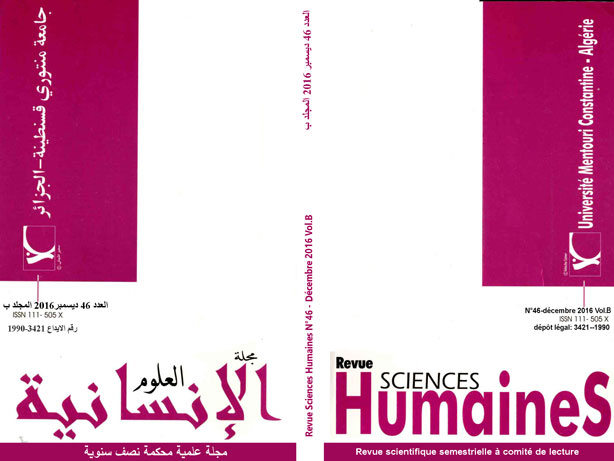Le mythe et le réenchantement de l’écriture, Albert Camus et Romain Gary en quête d’une parole originelle
الكلمات المفتاحية:
albert camus، romain gary، mytheالملخص
Albert Camus and Romain have in common to have placed the myth at the heart of creative writing business. They tried to return his existential dimension to the literature by integrating the power of mythic expression in the novel. The myth thus offers the opportunity of an encounter between two works that may at first seem very different view. This article precisely to connect thought and imagination of these writers to show how big the mythical expression taken as literature, to finally see what was their conception of myth, how they themed and incorporated in its various incarnations , in their respective works.
التنزيلات
المراجع
- ‘‘Le désenchantement du monde’’ est une expression attribuée au sociologue allemand Max Weber. Elle renvoie à la sécularisation du monde occidental, à la perte du sens, au déclin des valeurs et au triomphe du nihilisme.
- A. Siganos, « Définition du mythe », Questions de mythocritique, p.93.
- P. Brunel, Mythocritique : Théorie et parcours. Paris, PUF, Coll. « Ecriture », 1992, p.82.
- C. Delattre, Manuel de mythologie grecque, Paris, Bréal, 2005, pp. 232-233.
-C. Astier, « Interférences et coïncidences des narrations littéraire et mythologique », dans Le Dictionnaire des mythes littéraires, (sous la direction de P. Brunel), Monaco, éd. du Rocher, 2003, p. 1079.
- Ibid.
- V. Gely, « Pour une Mythopoétique : quelques propositions sur les rapports entre mythe et fiction », Vox Poetica, mai 2006, URL : http://www.vox-poetica.org/sflgc/biblio/gely.html
-K. Thomas, « Romain Gary songe humain », Acta fabula, vol. 11, n° 5, Notes de lecture, mai 2010, URL: http://www.fabula.org/revue/document5701.php
-M. Bilen, « Comportement mythico-poétique », dans Le Dictionnaire des mythes littéraires, op.cit., p. 357.
- O. Todd, Albert Camus, une vie, op.cit., p.969.
-Pour ce qui est du mythe de Caïn dans l’œuvre de Camus, voir l’article de C. Hussherr, « Lecture du mythe de Caïn et Abel chez Albert Camus et Pierre Emmanuel, de l’exil terrestre à l’enracinement dans la terre. », Presses universitaires de Paris Ouest, 2009, URL : http://books.openedition.org/pupo/1447?lang=fr
- O. Todd, Albert Camus, une vie, op.cit., p.970.
- ‘‘Doppelgänger’’, terme forgé par Jean-Paul Richter, en 1796, et qui signifie littéralement : « celui qui marche à côté, le compagnon de route ».
- Epigraphe de L’Homme révolté, Paris, Gallimard, coll. « Folio Essais », 2011.
-P. Albouy, Mythes et mythologies dans la littérature française, Paris, Armand Colin, 1998, p. 97.
Bibliographie :
Albouy, P., Mythes et mythologies dans la littérature française, Paris : Armand Colin, 1998.
Anissimov, M., Romain Gary, le Caméléon, Paris, Editions Denoël, 2004.
Brunel, P., Le Dictionnaire des mythes littéraires, Monaco, éd. du Rocher, 2003.
Brunel, P., Mythocritique : Théorie et parcours, Paris, PUF, 1992.
Camus, A., L’Homme révolté, Paris, Gallimard, 2011.
Camus, A., Le mythe de Sisyphe, Paris Gallimard, 2011.
Camus, A., Prométhée aux Enfers, dans L’Eté. Paris, Gallimard, 1954.
Détienne, M., L’invention de la mythologie, Paris, Gallimard, 1981.
Eliade, M., Aspect du mythe, Paris, Gallimard, 1963.
Gary, R., Le Grand Vestiaire, Paris, Gallimard, 2004.
Gary, R., Les mangeurs d’étoiles, Paris, Gallimard, 1981.
Gary, R., Pour Sganarelle, Recherche d’un personnage et d’un roman, Paris, Gallimard, 2003
Gilbert, D., Le Décor mythique de « La Chartreuse de Parme », Paris, José Corti, 1961.
Pérez, C., Romain Gary, la Comédie de l’Absolu, Bordeaux, Eurédit, 2009.
Saïd, S., Approche de la mythologie grecque, Paris, Nathan, 1993.
Sarocchi, J., Camus, Paris, Presse Universitaire de France, 1968.
Todd, O., Albert Camus, une vie, Paris, Gallimard, 2012.
















